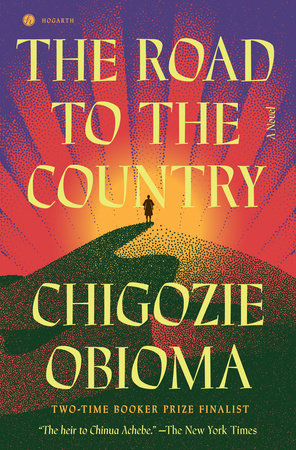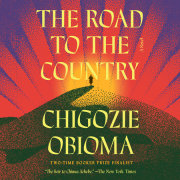1For the first time in nearly an hour, Kunle rises from the cane chair and looks at his wristwatch, then at the small bush outside. The rain, which had started shortly before he sat to write, has stopped now. On the soft earth closer to the window, a small bird totters, a writhing red worm clasped in its beak. He feels again the presence, the unusual sense of something, a thing alive yet invisible, watching him. He glances up, then around. But there is no one.
He begins to go through the “story” he has just written. At once he is surprised by how many of the details about the accident have remained in his mind, even after all these years. It was only this morning that he’d walked into the auditorium near the Law Building and heard a lecturer speak about writing to free oneself. He’d rushed home, picked up a pen and the notebook. And now, pieces of his childhood—blown in from remote corners of the past—are gathered in these few sheets of foolscap paper.
As he rereads, the details rise before his eyes in vivid colors: Nkechi, standing beside him, nine years old just like him. She wears on her face the beauty of youth; her hair is permed and ribboned, and her skin shiny with pomade.
“Darling, let us send Tunde outside, oh?” she says, leaning into his left ear. “Let him not disturb us.”
“Oh, okay,” he says.
Nkechi whispers something else to him, and abruptly he turns towards the door as Tunde, only six, comes in swinging. Tunde tells them he wants stew, and rice, and goat meat. Kunle listens to his brother’s chatter with half his mind as Nkechi steps closer, cups her hand around his ear, and says, “Darling, send him away—o? Mmhuu . . . Send him away so that he will not disturb us again.”
Kunle leads his brother out of the kitchen to the yard, partly grassy, partly dirt. He picks up a small green football from the dirt and kicks it over the fence.
“It is a goal! It is a goal!” Tunde yells and runs out of the compound after the ball.
Kunle hurries back into the house and locks the door. He is clasping his hands around Nkechi in embrace when they hear Tunde’s scream.
This moment was hard for Kunle to write—four lines on the foolscap sheet here were erased and rewritten, in some places twice over. But what he allowed himself to put down in the end is that he is confused, dazed. He runs in the direction of the scream and meets instead a small crowd of people. Tunde is lying on the ground beside an Oldsmobile whose fender has been damaged, doors flung wide open, and from whose rear a whiff of smoke is rising. Tunde’s face is covered in blood, his hands thrown apart. “Tunde! Tunde!” Kunle cries, rushing forward towards his brother. He finds himself being pulled back by stronger hands as he kicks and flails, crying his brother’s name.
Kunle puts the book down presently and rises as if new blood has been pumped into his body, stirring every limb with its fresh, hot life. What should he do with this writing? For a long while he stands there with these thoughts, until he hears a knock on the door. He looks about at his room and then, quickly, he dumps the half-eaten bowl of garri into the bucket under the table and tosses a dirty shirt behind the bed, leaving only a library book on the bed.
Uncle Idowu’s belligerent voice follows the persistent knocking: “Kunle, have you gone deaf?”
At once, Kunle fumbles with the lock, opens the door.
“Alagba?” Uncle Idowu says. “What is the problem?”
“Am sorry, sa. I was asleep. I was—”
“Eheh—by this time?” Uncle Idowu says, closing the door and gazing at the clothes hanging on a blue rope along the wall.
“I’m sorry, sa.”
Uncle Idowu sits on the sofa, his protruding belly looking like a big round ball.
“I don’t even know if . . . what are you doing?”
“I want to go and buy you mineral, Uncle,” Kunle says, glancing up from tying his shoelaces.
“No, no, sit down, Kunle. I am not here to drink Fanta or Seven Up. Your father sent me to give you a message.”
Kunle sits on the bed, facing his uncle in the full glare of the evening sun.
“You have heard that there is war in Eastern Region, abi?”
Kunle shakes his head. “I’ve been—”
Uncle Idowu’s eyes go wide. “What? You have not heard?”
Ashamed of his answer, Kunle only mutters “No” under his breath. His transistor radio has been out of batteries for a long time. But now it becomes clear to him that there were signs he simply missed: the first was of two boys in his class who simply disappeared—Igbo twin boys. Both were outspoken and raised several issues during the course on Nigerian history. Since the middle of the last semester, both have disappeared. And only two weeks before, on his way to the hall to take his Law of Contract exam, he saw students protesting outside the vice chancellor’s office, holding up banners that said things like no war! one nigeria! end tribalism!
“Kunle, do you know the meaning of this?” Sitting forward, Uncle Idowu pushes the sleeve of his agbada from his elbow back to his shoulder. “There is a war happening in your country and you don’t know? Just imagine that!”
“I am sorry, sa.”
“Turn a new leaf, eh—turn a new leaf, young man,” Uncle Idowu says, reverting to English, the language he speaks when angry or tense. “I have told you this isolation is not good, eh? You are a young man, nitori Olorun!”
“Yes, sa.”
“Ehen, Ojukwu and his rebels have declared war . . . Anyway, that one is their problem. I am here because of your brother. That boy has vanished like a mist.”
“Eh?” Kunle says, turning with the hurried shock of a snakebite.
“Oh, yes! Your father sent me telegram and told me. Somebody—his friend, a girl. Imagine small boy like him following woman into a war zone. A boy who cannot walk . . . who sits only in wheelchair?” Uncle Idowu sighs. “Children nowadays, eh! Can you imagine? . . . Sha, you have to go to Akure as matter of urgency—first thing tomorrow morning.”
Kunle nods.
“After all, school have finished for this term, abi?”
“Yes, sa—since last Friday, sa,” Kunle says and casts his eyes down again.
“You see? Almost three days since school finish and you are still here, eh? Don’t you have family?”
“Not-thin, sa . . . I was . . . I—”
He does not lift his eyes to look at his uncle, knowing that he cannot admit that for the past week, he’s been thinking of going home. But every time he made up his mind to go, he would recall the accident—Tunde being carried away, bloodied—and it would bring the fear of encountering his brother, of being faced with the reality of what he did. Instead, in the past few months, he’s been writing letters home every two weeks—to Tunde. He did all his talking in the letters, usually about small things (the books he’d read, the history of English common law), but always, he ended each note with a plea—that Tunde forgive him. And each time he mailed a letter home, he felt relieved. But soon he’d become doubtful of the letter’s efficacy, and it was this feeling more than anything else that kept him away from Akure.
Uncle Idowu hands him two one-pound notes. “That’s your transport money, eh? Make sure you go tomorrow.”
Kunle stands behind the door after Uncle Idowu leaves, pained by the fact that his uncle is right: he is living a hermitic, selfish life. For the last few days, he has been gathering up bits and pieces of his past like a mole, filling the room with images of his brother before the accident: the times they slept together on the same bed, when they played kantas with bottle caps or drew sketches of each other on the wall of their shared room, or sang with their mother. One of these memories stood out: the moment in ’58, two years after the accident, when he overheard his mother say to his father that the accident had happened because Kunle was cursed: “It is a curse, surely . . . I have always known since the prophet came here on the day he was born. If not, then explain it to me how this evil would befall his own brother?”
Copyright © 2024 by Chigozie Obioma. All rights reserved. No part of this excerpt may be reproduced or reprinted without permission in writing from the publisher.






